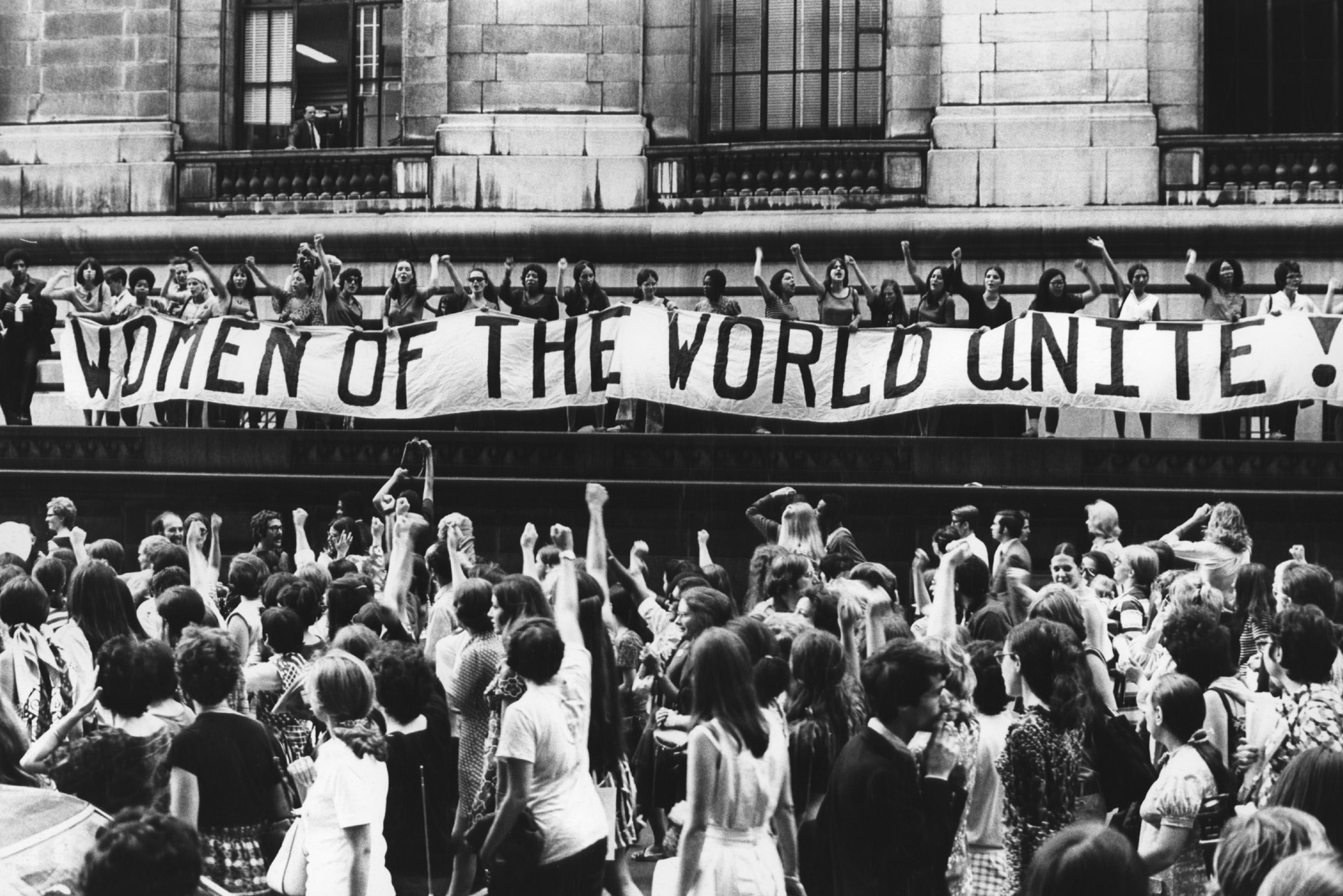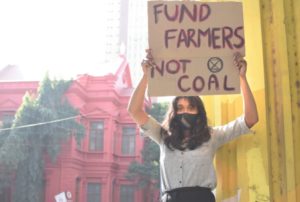Audre Lorde is famous for having said: “I am not free while any woman is unfree, even when her shackles are very different from my own.” Women across the world protest, march, write, mourn, dream, go on strikes—for our collective rights and possibilities. This International Women’s Day, we take inspiration from some women activists that remind us of what we’re fighting for.
How it started: reclaiming our radical roots.
The core of International Women’s Day (or International Working Women’s Day) is anti-capitalist and revolutionary. The first International Women’s Day took place in 1911: it bloomed on the streets, with demonstrations, posters and pamphlets drawing women closer to each other and the trade unions that would build their power. Political consciousness grew too, illuminating their hearts and minds with the clarity and vision of a just future.
In 1913, Russian revolutionary Alexandra Kollontai published ‘Women’s Day’, an essay that’s equally, if not more, relevant in this capitalist age. When we say “International Women’s Day”, we remember the power of thousands of women who didn’t leave the streets till the Tsar resigned. We mean doing away with corporate hierarchies, we mean liberation for all women. Lorde would agree.
Where are we at right now?
The featured image of this article captures a luminous moment: women marching past a banner that reads ”WOMEN OF THE WORLD UNITE” to commemorate the 50th anniversary of Women’s Suffrage in the United States in 1970. (“Women of the world unite” is adapted from a popular political slogan, “Workers of the world, unite.”) The women’s suffrage movement was a decades-long fight to win the right to vote for women in the United States. It took activists and reformers nearly 100 years to win that right.
As the climate crisis worsens inequalities, the movement has different futures to reimagine and organise towards. Lately, (especially with the pandemic and work/home boundaries blurring) we have been hearing a lot of talk about “the crisis of care,” often linked to time poverty, family/work balance and social depletion. In an interview with Dissent, Nancy Fraser offers a radically different vision of gender justice, in which she compares these care capacities in capitalist societies that are taken for granted, treated as “free” and “infinitely available gifts”, to the way nature is treated. As an infinite reservoir from which we can extract and dump waste into. She argues that both are, in fact, finite.
Nancy says, “The current, financialized form of capitalism is systematically consuming our capacities to sustain social bonds, like a tiger that eats its own tail. The result is a “crisis of care” that is every bit as serious and systemic as the current ecological crisis, with which it is, in any case, intertwined.”
The question now is: how can this be fixed?
The structural basis of today’s crisis of care is capitalism’s drive that puts profits over people. Any amount of “acknowledgement” of women’s labour on International Women’s Day is only symbolic, and virtually meaningless if it isn’t grounded in prioritising struggles (healthcare, clean water, housing and climate relief) for women of all classes, especially in the global South. To mark International Women’s Day 2022, we bring you a selection of women activists leading change: voices that should be heard far wide, a rallying cry to our ongoing feminist movements.
Disha Ravi
Disha A Ravi is a 23-year-old climate and environmental activist with Fridays For Future. She became an activist after she saw her family impacted by the water crisis. On 13 February 2021, Disha Ravi was pushed into the global spotlight after being arrested by Indian police for “sedition and conspiracy” over a farmers’ protest toolkit that was shared on Twitter by Greta Thunberg. At the time, hundreds of thousands of farmers in India had been protesting over new farming bills that they said threatened their livelihoods.
In an opinion piece for Al Jazeera, she writes: “The climate crisis is about the Global South’s present. Not the Global North’s future. Young people around the world are anxious about the future, and rightfully so, but a warped focus on it suggests that the general populace would rather care about white children’s future than the Black, Brown and Indigenous children’s present. If this is to continue, then we have already lost.”
Sumak Helena Gualinga
Helena is a 22-year-old environmental and Indigenous Rights Defender. Her work focuses on the intersection of Indigenous rights and climate change, and she has a wide digital reach that helps bring awareness to issues affecting her community. “The activism [is] of my people, my community,” she says in an interview with Refinery29, “and I am only someone who is trying to make people listen to those people. Because the people that actually are doing the work are in the communities, they are in the Amazon, they are on the ground. They are protecting, literally with their own bodies sometimes, their lands and protecting huge areas of forest, waters, et cetera.”
Just last month, we wrote about massive oil spills on the banks of the Coca River in the Ecuadorian Amazon which affected thousands of families. And that wasn’t the first. 2020’s spill led to the indigenous people suing the government. Like many indigenous groups, Ecuador’s Sarayaku community faces the constant threat of losing their land, which is highly sought after by extractive industries. These industries have been able to exploit the territory for oil exploration since 1996 when the Ecuadorian government signed a contract with national oil company Petroecuador and CGC, a subsidiary of Chevron in Argentina.
This is why stopping the fossil fuel industry is our primary concern. In 2020, while juggling her school work, she spearheaded a campaign called ‘Polluters Out’, an international youth-led coalition that now has over 200 young climate activists, scientists, indigenous people, and members of grassroots organizations from over 40 countries around the world.
Mitzi Jonelle Tan
Mitzi Jonelle Tan is a climate justice activist based in Metro Manila, Philippines. She is the convenor and international spokesperson of Youth Advocates for Climate Action Philippines (YACAP), the Fridays For Future (FFF) of the Philippines. She decided to fully commit her life to activism in 2017 after integrating with the Lumad indigenous leaders of her country which pushed her to realize that collective action and system change is what we need for a just and green society.
Philippines has had the highest number of extreme weather events in the past twenty years. In a recent tweet, Jason Hickel highlighted that for every $1 of aid the global South receives, they lose $30 through unequal exchange with the North. Poor countries are developing rich countries, not the other way around. Mitzi echoes this in her piece for The Elders: “The climate debt the Global North owes to us most affected is a debt that must be paid. Philippines has been pushed into the floods by the years of historical carbon emissions of the Global North, and each day that the fossil fuel industry is allowed to exist and sink its claws into our society is another stone tied to us, weighing us down.”
Larissa Kennedy
Larissa is the current president of the National Union of Students (NUS), UK. Ever since she was 16-years-old, she’s been organising against sexual violence, student fees, racism and more. Last year, she headed to Glasgow to attend COP26 and pushed for a radical change in the education system (and the world), beginning with the 3 D’s: Divestment, Decarbonisation and Decolonisation.
In a student manifesto written for Shado Mag, she recognises, “The climate crisis is a racist crisis. The responsibility of the UK in the face of the climate crisis is not only down to emissions in the present; we must also consider the historical debt the UK owes the rest of the world. It was the British Empire that created and exported the exploitative and environmentally destructive model of industrial capitalism that has fuelled the crisis we now face.”
Reimagining a decolonial and just student movement entails thinking about the power of the education system—with marginalised students even less likely to perform/function during the pandemic, it’s about time we addressed their inherent systemic inequality. Simply normalising or returning to “business as usual” will not do. The students of the future deserve better. Join the student strikes here and read more about the decolonial student movement here.
Ayisha Siddiqa
Ayisha is the Pakistani American co-founder of Polluters Out (a global youth movement that is calling for the fossil fuel industry to be banned from events and negotiations related to the United Nations climate treaty, formally known as the U.N. Framework Convention on Climate Change) and Fossil Free University. In 2019, she helped organise a 300,000-person strike in New York City. The next day, there were youth-climate meetings at the United Nations in New York City.
“Justice has always, always been a part of my climate fight—whether I knew it or was able to articulate it,” Ayisha shares in an interview with Atmos, “Polluters Out has a very tangible task. It is not only measurable; it is achievable. It has been done before. The World Health Organization set a precedent when they kicked out Big Tobacco. That allowed the U.S., the U.K., and other wealthy nations to put taxes and warning labels on tobacco. It changed the course of what we thought. And this is just tobacco, right? It’s internally harming people. Fossil fuels are the leading cause of the climate crisis—the leading cause.”
….and more
The list is endless, so take a plunge:
Nodeep Kaur: Indian labour rights activist. Check out her interview on the farmers’ and workers’ struggles on Workers’ Liberty.
Zamzam Ibrahim: Vice President of the European Students’ Union
Mythili Sivaraman (1939 – 2021): Indian women’s rights and trade union activist and writer; co-founder of All India Democratic Women’s Association. You can find her works at LeftWord Books.
And don’t forget to read our piece on Black History Month, featuring Claudia Jones, Patrisse Cullors, bell hooks, Vanessa Nakate and more.
FEATURED IMAGE: Photo by Fred W. McDarrah, via Getty Images | IMAGE DESCRIPTION: A black and white image of women marching along 5th Avenue, past a banner that reads ”WOMEN OF THE WORLD UNITE”, to commemorate the 50th anniversary of Women’s Suffrage in the United States. (New York, August 26, 1970)



